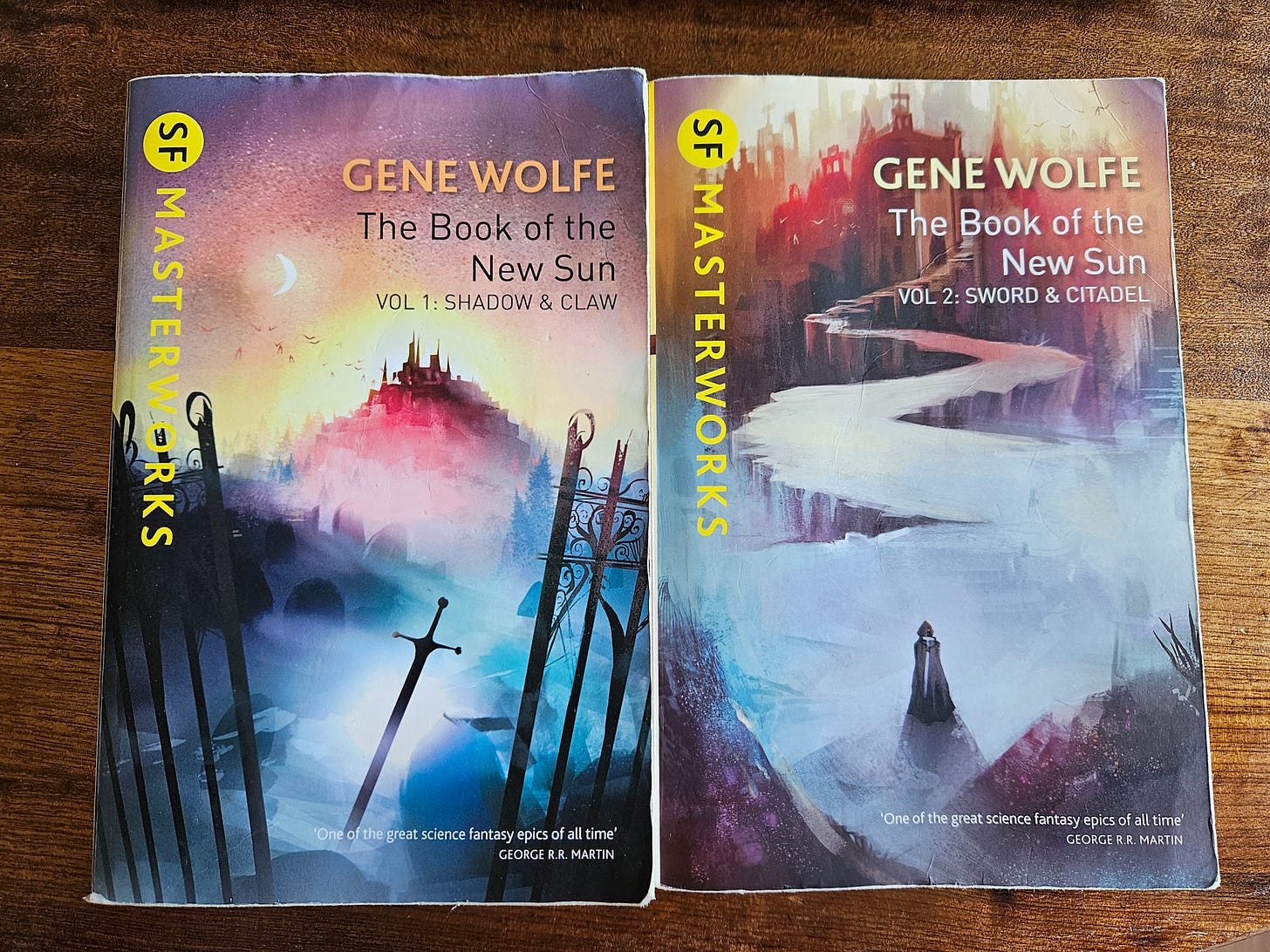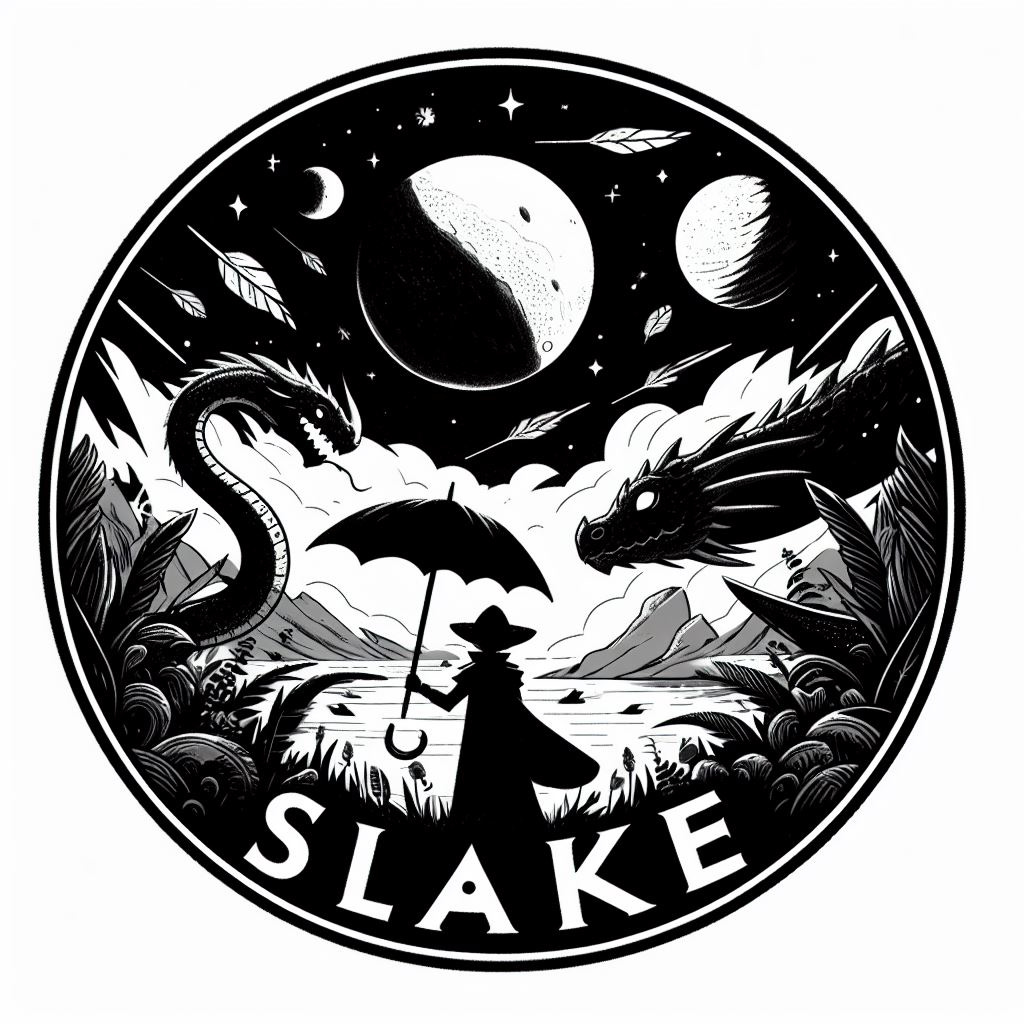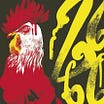Why I ❤️ Gene Wolfe's "The Book of the New Sun"
The Books We ❤️ Club welcomes Nathan Slake
I could write a whole essay about
’s rich, haunting, ethereal stories; his immense kindness toward me and writers everywhere; his heartfelt comments, week in, week out, rain or shine; and his unslakeable love of reading and writing. 😘Instead, I’ve invited him to present his thoughts on The Book of the New Sun and the author Gene Wolfe, a winner of the “Grand Master” title by the Science Fiction and Fantasy Writers of America.
Best known for the book(s) in question, I read and wrote about his standalone novel Peace back when I first was starting on Substack, and let me tell you, there were some very strident fans of Wolfe who did not take kindly to my cool take.
See, Gene Wolfe is known for his extremely dense, allusive prose—the references, puzzles, and symbols are often crucial to the understanding of his stories—and it is a next-level reading experience. Peace is best enjoyed with the assistance of the 25-hour podcast series mentioned in my other article, and as you will see below with the YouTube companion guide, The Book of the New Sun also has innumerable fandom scholarship sources to help you understand his work.
Often called the Herman Melville of science fiction, I would liken him more closely to the James Joyce of sci-fi, and with that, I will let Nathan take it away.
The Books We ❤️ Club—the book club you don’t actually have to read the book, leave the house, or even change out of your jammies to enjoy as writers sing the praises of books that reach into our hearts.
We invite you to add your own reactions, insights, and ideas in the Comments for an impromptu book club session. Share your favorite quotes, characters, moments, and surprises in discussion with other passionate readers.
(And if you’d like to feature your favorite book in a future edition, DM me.)
The next edition of The Books We ❤️ Club will feature and his selection of Raymond Carver’s What We Talk About When We Talk About Love.
Why I ❤️ Gene Wolfe's The Book of the New Sun
by
ofThe front cover of the book I’m holding carries a quote by George R. R. Martin: ‘One of the great science fantasy epics of all time.’ High praise, especially from the man who himself penned one of the best—cough, unfinished—pieces of modern fantasy.
It’s actually two books that I hold. Well, technically it’s four. I should explain. Gene Wolfe’s masterpiece, The Book of the New Sun, spans four1 main entries: The Shadow of the Torturer, The Claw of the Conciliator, The Sword of the Lictor, and The Citadel of the Autarch, each some 300 or so pages long and published between 1980 and 1983. It strikes me as no great surprise or coincidence that the final book was published on the precise day I was born2.
Modern printings wrap these books up into a pair of two-volume sets, including the SF Masterworks copies that I own (there is a glorious Folio Society special edition that I will one day be mine).
To truly get to the depth of meaning that Gene Wolfe is conveying requires multiple reads and I have only read it once. That makes me feel wholly under qualified to even be writing about it. For that reason, and because it would take far more than a thousand words or so, I don’t want to dwell too much on what these books are about, or even to delve into the many interpretations of its themes. There are many resources for that3. Instead, I hope to convey, in a handful of words, why I was so taken by these books and the impact they’ve had on me—after all, I think that is what this series of Troy’s is all about.
The story concerns Severian, who begins the series as a torturer’s apprentice in the ancient, decaying city of Nessus on a planet (Urth) that orbits a dying sun. After showing considerable mercy to a prisoner—an act that violates the rules of his guild—Severian is cast into exile, thus beginning his journey out and away from Nessus and across a planet filled with mystery and danger, myth and ambiguity. The story weaves a labyrinthine experience of hints to Urth’s future, past and rebirth, and what role Severian plays in it all.
The narrative is first person, written from Severian’s point of view and as a recounting of the events of his life. The extra layer here, though, is that Gene includes appendices that purport that he has found this “Book of the New Sun” and is himself translating it!
The following quote is from the epilogue of the first book:
In rendering this book—originally composed in a tongue that has not yet achieved existence—into English, I might easily have saved myself a great deal of labor by having recourse to invented terms; in no case have I done so. Thus in many instances I have been forced to replace yet undiscovered concepts by their closest twentieth-century equivalents.
—The Shadow of the Torturer
Gene’s style is poetic, rich, intellectual and, in many respects, demanding. It asks the the reader to be careful and meticulous and to keep a spade at hand to dig beneath each word and sentence, uncovering another meaning or a tunnel that leads back a hundred pages to events that, at the time, made little sense. I found the experience deeply rewarding. I read slowly and savoured the feelings each page evoked. Few books have ever left me feeling so.
To offer a flavour, here are several quotes, taken almost at random from the books but from sections I underlined or annotated because they held special significance or merely left me marvelling at the words:
These were shaggy-barked conifers for the most part, tall, straight trees that leaned, even in their height and strength, away from the shadow of the mountain, and showed plainly in at least a quarter of their number the wounds of their wars with wind and lightning.
///
Next day, for the first time, I carried Thecla’s supper to her. For a watch I remained with her, frequently observed through the slot in the cell door by Drotte. We played word games, at which she was far better than I, and after a while talked of those things those who have returned are said to say lie beyond death, she recounting what she had read in the smallest of the books I had brought her—not only the accepted views of the hierophants, but various eccentric and heretic theories.
///
It seemed to sparkle in the summer sunlight, brighter indeed than I had ever seen it without its sapphire case. I touched him with it, then, urged by I cannot say what impulse, put it into his mouth.
I could go on, but to do so would be to recount every page.
I’m going to end this by saying I’ve been nervous about writing this post. It has weighed on my mind. Often, I put pressure on myself because I want something to be as good as possible and, of late and due to work, that has become rather difficult to manage.
But holding these books, leafing through them again and smiling at the many marginalia I have scrawled—my amazement at certain revelations, my rife speculation, my double-underlining of the sheer poetry of much of Wolfe’s writing—filled me with a certain, indescribable calm. And that, above anything, is why I love these books.
Beyond the brilliance, the intricacy, the complexity and world building, far beyond the mind-bending concept of what might have ultimately transpired in Severian’s arc and the extent to which one can grasp any of that in a single read … beyond all of that I love these books because of what they instill in my soul.
I feel calmed just by holding these books. I feel the real world and all its tribulations close off as I slip forward to Urth and reacquaint myself with Severian, Thecla, Jonas, Jolenta and Dorcas, and all the other characters that comprise its cast. I want to leaf through the pages and remember and marvel and I can feel the wry smile touching my lips even as I glance now at the page.
It may be you dislike these books. It may be you wrinkle your nose at the frustration and posturing of an unreliable narrator, the story’s ambiguity, the meandering and esoteric intricacies and peculiarities of its plot (not to mention Gene’s sometimes, ahh, more male-focused narrative). It may be that that is you. But that’s OK. I don’t mind. I love these books, and for me that is enough.
There is a fifth entry, Urth of the New Sun, that was written in 1987. I’m not going to mention it further because I—don’t judge me!—haven’t read it yet.
Obviously this is an absolute lie. The year is correct, though whether the date is such I am too afraid to check.
This recent video essay on YouTube by Media Death Cult is tremendous.













I'm at chapter XVII and am loving it. Thankfully, there are no spoilers in this post! All I can do is fully agree with Nathan before dashing off to Urth again.
Wow wow, Troy this series is really coming along so well and I adore the intro!
Nathan, what an endorsement. I’m not sure why I’ve never had a go at Wolfe’s work. The concept of tackling something by him has been brewing as you mention him in other comments as well. Now I need to know for myself. The quotes are truly beautiful and you know I’m always up for an unreliable narrator. Thanks for sharing your passion for his work despite your concern to get it right and thanks to Troy for hosting you.